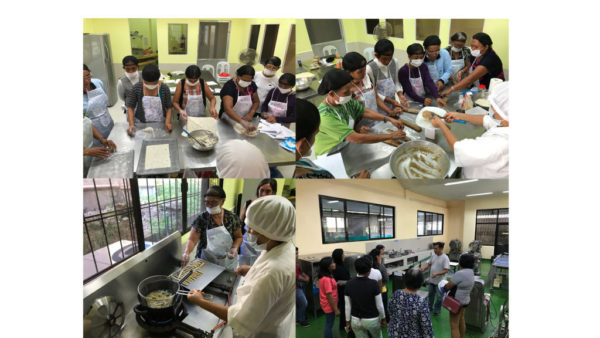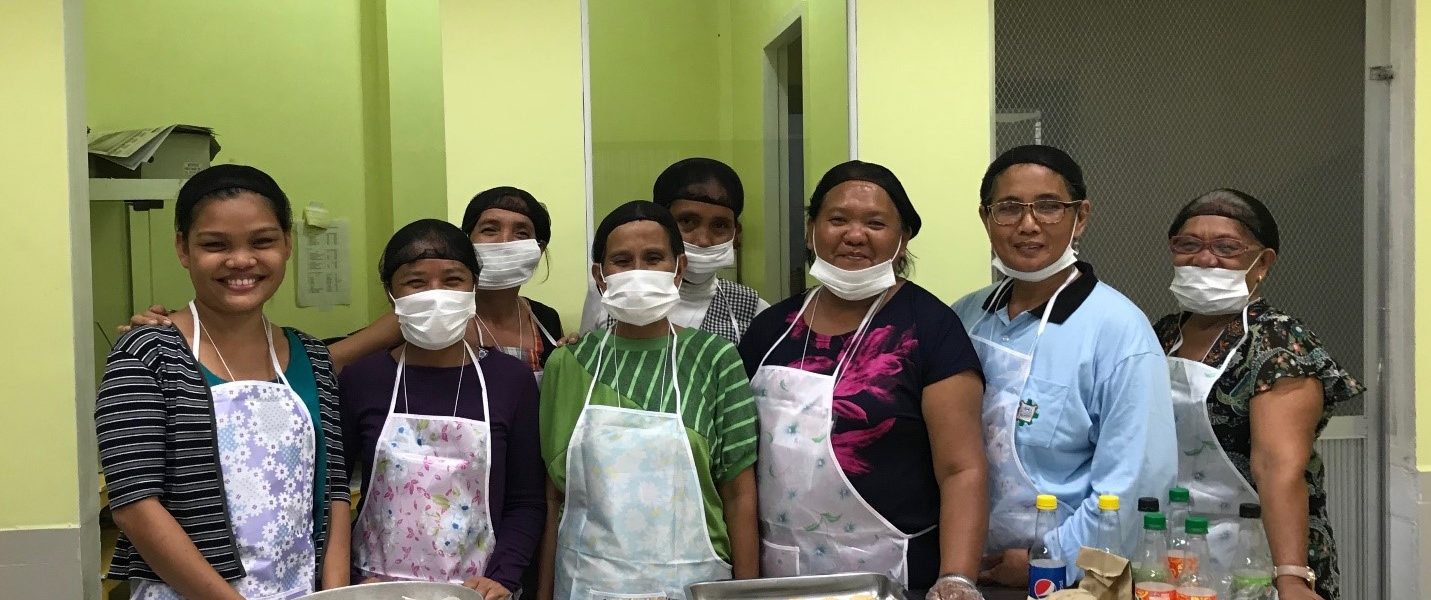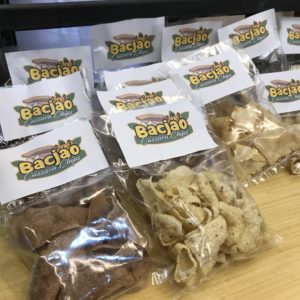Who knew so many different products could be made from cassava? Now thanks to the Aqua-based Business School (ABS), some Filipino fisherfolk women trained in food processing are ready to get down to business.
Eight members of the Fisheries and Agricultural Crop Producers Association of Bacjao (FACPAB) from Balangiga, Eastern Samar, were trained on cassava food processing on March 25 – 26, 2019, at the Philippine Root Crop (PhilRootcrops) Research and Training Center of the Visayas State University, Baybay City, Leyte.
FACPAB is one of the 14 pilot groups composed of farmer – fisherfolks enrolled in the ABS in Eastern Visayas. ABS is a joint endeavor of the Food Resilience through Root and Tuber Crops in Upland and Coastal Communities of the Asia-Pacific (FoodSTART+) project of the International Potato Center (CIP), and the Fisheries, Coastal Resources, and Livelihood (FishCORAL) project of the Bureau of Fisheries and Aquatic Resources, implemented in the Philippines. ABS is a value chain development methodology adapted from the farmer business school (FBS) first piloted by CIP in Indonesia in 2008.
The training is part of the group’s slated activities under the fifth ABS module, where the groups identify and test potential innovations. The group focused on cassava as their chosen commodity, for which they also were trained on production and farming practices by the Municipal Agriculture Office of Balangiga. Additionally, quality planting materials of a local cultivar (‘Kaplutan’) and a high-yielding variety (‘Rayong 5’) ideal for food processing from PhilRootcrops, were introduced in the area for mass propagation and distribution to other farmers in the community. Better varieties, coupled with improved farming practices, can contribute to a higher yield and quality of cassava.
During the training, Dr. Julie D. Tan, head of PhilRootcrops’ post-harvest division, spoke about the health benefits and livelihood opportunities of root crops. “Does eating root crops like cassava and sweetpotato (camote) help you lose weight?” asked Hilda Pabillo, training participant and FACPAB member.
“Yes!,” Dr. Tan answered positively, mentioning how both the low glycemic index of root crops and their high-fiber content help reduce weight.
The participants learned from Lucenita Estoy, PhilRootcrops’ resident food-processing expert, how to make various products from cassava using processing methods developed by Visayas State University–PhilRootcrops such as cassava chips, macaroons, pichi-pichi (cassava cake with coconut), espasol (rice cake), cookies, jolly roll, and yuca sticks (fried cassava sticks). Dr. Tan went on to discuss food safety and hygiene in food processing, a topic she strongly emphasized since the participants plan to venture into larger-scale commercial production.

Clockwise from top left: FACPAB ladies trying their hand in making cassava chips with malunggay (moringa) sheets, cassava espasol, Jojo Cinto discusses the cassava extruder, and a participant helps Lucenita Estoy fry yuca sticks.
Jojo Cinto, PhilRootcrops’ processing facility officer-in-charge, facilitated the group in their visit to the facility. There, he presented and discussed several kinds of root crop-processing equipment such as the cassava grates and flour system, extruder, vacuum fryer, and dehydrator. These are some of the equipment that FACPAB may acquire in the future if they decide to venture into a more complex enterprise.
FACPAB is one of the five groups from the first ABS batch that participated in the Stakeholders’ Validation Workshop (SVW) in Tacloban City on April 4 – 5 2019. At the workshop, FACPAB showcased their prototype cassava chips, macaroons, yuca sticks, and jolly rolls. On a 1 to 5 acceptability scale (with 5 being the highest), their products’ overall acceptability ranged from 3.7 (macaroons) to 4.5 (cassava chips). Not bad for a group that was trained only the previous week.
The SVW is particularly important in the product development process of the ABS groups. They received helpful feedback for their products such as “yuca sticks and jolly rolls should be uniform in size,” “macaroons tastes good but is slightly burnt,” and “improve product presentation by improving labels and put additional information such as net weight and ingredients” for their packaging. The stakeholders asked all the ABS groups to provide their products’ complete nutrition information in order to break into a larger market. At a second SVW, held on April 24 – 25, the second batch of ABS groups presented their product prototypes to their stakeholders.
Together with other ABS groups, the FACPAB products will be showcased during the Business Launch organized by FishCORAL and FoodSTART+ on May 29, 2019, in Tacloban City.
Blog and photos by Guada Babilonia and first published on the FoodSTART+ website.

